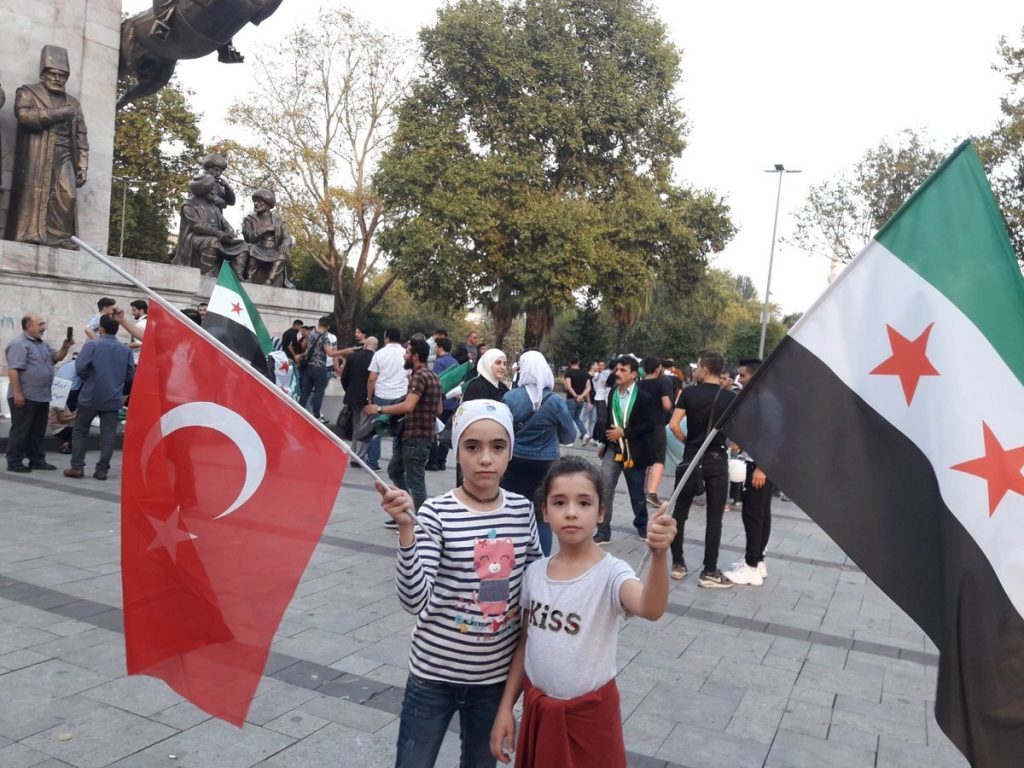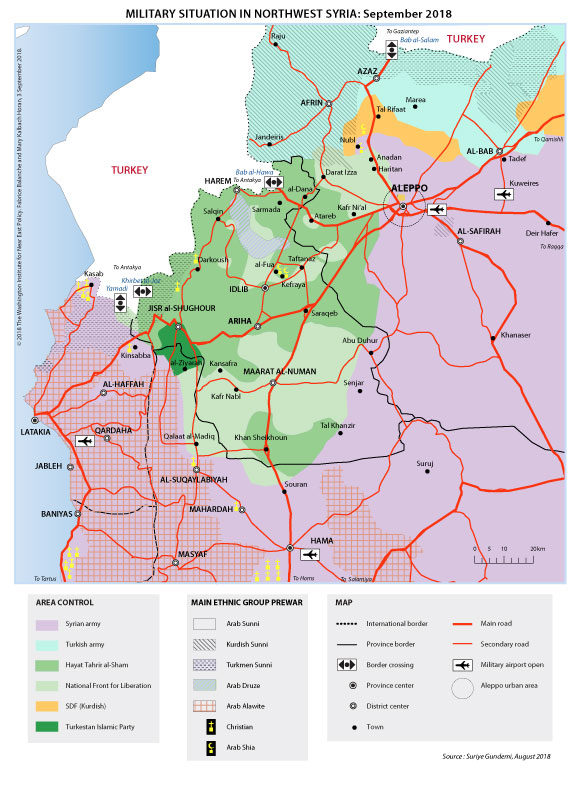The Independent's Middle East correspondent Robert Fisk is, as far as we know, is the first and only Western journalist to have assessed the situation from the front-line of Idlib. Rather than witnessing the 100,000 Syrian soldiers said to be amassing for the assault, he came across a contingent of some 200 Syrian soldiers with no armored vehicles or heavy weaponry. Not much else out of the ordinary was to be seen that would indicate that the storming of Idlib was imminent. Only preparatory Russian and Syrian airstrikes targeting jihadi positions between Hama and Idlib have been reported.
It was to be expected that the attack would not begin before president Vladimir Putin of Russia, Hassan Rouhani of Iran and Recep Tayyip Erdogan of Turkey met in Teheran on the 7th of September to discuss a common strategy for Syria. Before and after the meeting, the government of Turkey echoed the West's opposition to the offensive in the name of avoiding civilian casualties. This is of course a hypocritical narrative, as the US showed no such concern when leveling Raqqa last year with the help of Kurdish militias; and Turkey is illegally occupying the northern area of Syria around Afrin, and has a vested interest in protecting Jabhat al-Wataniya al-Tahrir (aka the National Front for Liberation), a 'rebel' coalition it created and which controls about half of the territory of Idlib (the other half is in the hands of Hayat Tahrir al-Sham, the latest incarnation of Al-Qaeda-in-Syria).
For a high resolution image of the map above, see here.
Turkey's original reason for stepping into Syria was to drive Kurdish militias away from its borders. While this has worked so far, it has also had interesting consequences. One is that Turkey has placed the US forces in the northeast of Syria in a difficult position by being unable to defend their Kurdish proxies against a fellow NATO member. Another is that the Kurds and the central Syrian government have found common cause, besides defeating ISIS, in ridding the north of Turkish forces. What both of these effects have in common is that they obstruct America's infamous 'Plan B' of slicing a Kurdistan out of Syria in order to turn it into a US/Israel client state.
Turkey, Russia and Iran are joining forces in regard to certain key issues apart from Syria - for example, in ditching the dollar for their commercial transactions. While Syria is determined to recover the entirety of its territory, it naturally does not need a direct confrontation with Turkey. Therefore, if there is no hurry to start the 'Battle of Idlib', it is probably because Russia, Syria and Iran are attempting to reach a compromise with Turkey.
As they buy time, the liberators of Syria will be especially interested in avoiding any inconvenient escalations that disturb the process of reconciliation. This would explain in part why Russia has been insisting so much that the threats of US and European officials - John Bolton, Mike Pompeo and Nikki Haley among others - to retaliate against Syria if it uses chemical weapons, will be met with a false-flag provocation organized by terrorist groups and the White Helmets in Idlib, as they did earlier this year in Douma. As I write this, the Russian Reconciliation Center in Syria has announced that the White Helmets have shot nine videos of a staged chemical attack in the town of Jisr al-Shughur. Russia has warned against such tricks in the past, but the amount of detail about the nature and timing provided on this occasion seems to be intended to discourage or postpone their publication by preemptively destroying their credibility, therefore disrupting a US/UK/French aggression on Syrian forces.
If and when 'F.UK.US' perform airstrikes against Syria, we will most likely see a repeat of the limp display we saw back in April, although the possibility of escalation is ever-present. Still, at this point in time what Turkey does next is more critical to the end of the Syrian war than anything American and European forces could do.
Unfortunately, Turkey is not making things easy for itself or its neighbors. The following video, dated September 11th, shows Turkish military convoys purportedly building up their forces inside Idlib and Aleppo.
By supporting terrorist groups in Syria, Erdogan has made a deal with the devil and will now have to pay the price. Sooner or later, either by force or diplomacy, Turkish forces will have to leave Syria. But when that happens, what will become of the remnants of the soon-to-be destroyed Jabhat al-Wataniya al-Tahrir and Hayat Tahrir al-Sham? What of the refugees? Will they cross the border into Turkey, even if it is without its consent? And once there, what will they do? It's entirely possible that Turkey is being blackmailed by the USA and its Gulf allies: if it refuses to side with their agenda, it may find itself overrun by jihadis, just like Syria. Perhaps by now Erdogan has understood that helping to set your neighbor's house on fire carries the risk of burning down your own.
Syrian rebel threatens Erdogan against 'selling Idlib'
A militant from an unspecified group stationed in Idlib has issued a threat to Turkish President Recep Tayyip, warning that militants in northwestern Syria have dug a tunnel stretching into Turkey's Hatay province.
He went on to explain that in the event of Erdogan "selling Idlib", militants will use the tunnel to cross into Turkey, to potentially carry out attacks against civilians and security forces.
"Reyhanli [a town in Hatay province] is behind me. As you know, us [militants] from Ghouta are good at digging and since you've built a 960-kilometer border barrier... We want to tell you: if you sell Idlib or other opposition-held areas, we're going to buy Reyhanli from you. I won't give you more details, but this is your warning," the militant said in video footage circulating on social media.
The video was published just days after a trilateral summit in Tehran, attended by Russian President Vladimir Putin and his Iranian and Turkish counterparts, to discuss the situation in Idlib, ahead of the Syrian Army's impending offensive.





The U.S. can posture and threaten all they like but Russia is not going to let the Idlib pocket stand. Not a chance. If the Americans shoot off missiles, the Russians will shoot them down and let the whole world see they can do it. Bug problem for the U.S. Start shooting and the Russians can show you are weak. Russia has far too much hardware in the region. No way they are backing off. And not much the U.S. can do to stop it.
In short order, the insurgency in Idlib will be destroyed. All attempts to prevent or interfere with efforts to bring this about will fail. People everywhere can draw their own conclusions.